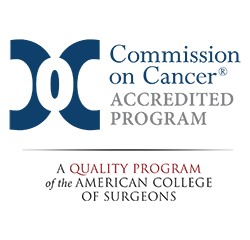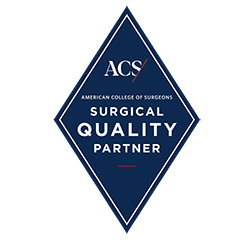Symptoms & Diagnosis
Colorectal cancer can feel like or lead to:
- Change in bowel habits lasting more than a few days
- Fatigue and weakness
- Rectal bleeding
- Sudden, unexplained weight loss
- Vomiting or abdominal pain
You know your body best and will be the first to notice if something doesn’t feel right. Early detection of colon cancer and rectal cancer can greatly improve your treatment success, so listen to your body and reach out to your primary care doctor if you think you are experiencing colorectal cancer symptoms. Your care team conducts colorectal cancer screenings and tests to check for growths in the colon and rectum. These tests may include:
- Colonoscopy. This exam uses a long, flexible tube to look at your rectum and colon. During your colonoscopy, your doctor may be able to remove abnormal growths such as polyps and other precancerous tissue.
- Barium enema. An X-ray of the abdomen can find narrowing or blockages in the colon or rectum.
- Sigmoidoscopy. This is a procedure in which your doctor uses a scope to look at the lower part of your colon
If you don’t have symptoms of colorectal cancer, your care team may recommend routine colonoscopies if you are over age 45 or have a family history of colorectal disease. These regular screenings can help find and remove precancerous growths while they are easily treated. You can take other steps to lower your risk of colorectal cancer such as:
- Eating plenty of fruits, vegetables and whole grains, and limiting processed food and red meat
- Exercising frequently
- Limiting alcohol to one drink per day for women and two for men
- Quitting smoking
If your tests find cancer, we refer you for a cancer consultation with an oncologist who specializes in treating colorectal cancer. This expert reviews your test results and medical history to learn more about your diagnosis and form a treatment plan tailored to your needs.
We know learning you have colorectal cancer can feel scary. That’s why we are committed to seeing you for a cancer consultation as quickly as possible — often within 48 hours — after your diagnosis so we can discuss treatment options, order additional tests and address any questions without delay.
Treatments
Your colorectal cancer is unique. You deserve a personalized care plan tailored to your needs and your type, stage and location of colorectal cancer. Each week, the Cancer Care team convenes a tumor board that brings together experts from across disciplines to collaborate on customized care plans for you. This collaboration has one common goal — to make sure you get the best possible care. Our multidisciplinary team of specialists, including surgical, radiation and medical oncologists who collaborate with gastroenterologists, interventional gastroenterologists, colorectal surgeons, radiologists and pathologists, is here to care for you through every part of your colorectal cancer treatment.
Surgery
Radiation
In addition to surgery, your cancer care team may recommend radiation treatment to target colorectal cancer cells directly. Radiation oncologists at our Radiation Treatment Center have treated thousands of patients, and we have a full set of state-of-the-art radiation treatments including stereotactic radiosurgery, adaptive radiation therapy and intensity-modulated radiation therapy. We also offer brachytherapy, or internal radiation therapy, that places high-dose radiation close to your tumor to shrink or destroy its cells. These sophisticated treatments bring precision, speed and the ability to save your healthy tissue. These methods also allow for higher doses in fewer treatment sessions than traditional radiation therapy.
Chemotherapy
Chemotherapy, or the use of anticancer drugs, can be a powerful treatment for colorectal cancer and a strong addition to surgery. We work with you to determine if chemotherapy is a good option for your colorectal cancer and collaborate on the right combination of anticancer drugs, anti-nausea medicine and pain medication for your needs. El Camino Health is also at the forefront of community hospitals using targeted drug therapy to treat colorectal cancer. We analyze your cancer to learn its protein and chemical makeup, then determine which drugs will have the maximum effect in fighting it.
Clinical Trials
We’re always looking for the next opportunity to improve detection, ease treatment and find better cures for your colorectal cancer. That’s why we collaborate with other medical centers and the National Cancer Institute on colorectal cancer clinical trials ranging from innovative chemotherapy to new forms of immunotherapy to supportive care options that ease the burden of cancer treatment.
If you’re interested in participating in this leading-edge research, talk to your care team to find a study that’s right for you.
Cancer Awards & Accreditations
Our superior Cancer Care has earned us a three-year accreditation as a comprehensive community cancer program from the Commission on Cancer of the American College of Surgeons (ACS). Accreditation ensures that the care you receive right here in your community is high-quality and uses evidence-based, national treatment guidelines.
We’re also an ACS Surgical Quality Partner and committed to the highest surgery standards.
Patients rate us highly, too. Based on PressGaney patient satisfaction surveys, our “likeliness to recommend” score is over 90%, and we’ve won the top patient experience award multiple years in a row.
 |  |
Cancer Patient Stories
You are our inspiration. Hear how El Camino Health Cancer Care has helped other patients beat their colorectal cancer — and how we can support you every step of the way.


